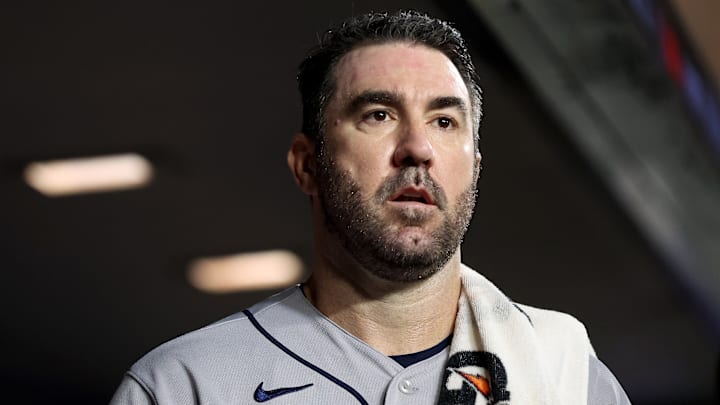For the second time in seven seasons, the Houston Astros big splash at the trade deadline was acquiring Justin Verlander. They once again parted with top prospects to get him, but effectively financed Verlander through the Mets.
They also landed Kendall Graveman from the Chicago White Sox, parting with Korey Lee to get him. Graveman was also acquired by Houston at the 2021 trade deadline.
But familiar faces aside, how did Houston do? Justin Verlander may not have been the JV of 2017, but was he still worth two top prospects? Did the emergence of Yainer Diaz make Korey Lee expendable?
It's time to re-grade the Astros' 2023 trade deadline.
While the Astros convinced the Mets to pay much of Verlander's salary (as much as $50 million), the deal did cost Houston regarding prospects. Drew Gilbert and Ryan Clifford, the Astros top-two prospects at the time, went to New York in exchange for Verlander.
For an already depleted farm system, it was costly, but it was definitely the right move to make. Verlander finished 7-3 in his 11 starts with the Astros, recording a 3.31 ERA and a 1.12 WHIP.
He wasn't quite as dominant as he was in his 2022 Cy Young season, but his stability was much-needed in an Astros rotation desperate for experience and an ability to go deep into games.
The Astros are likely watching the postseason from the couch if Verlander didn't save his best for last in his final two starts of the season. In two must-win games against the Mariners and Diamondbacks, Verlander recorded 13 innings of one-run baseball, allowing only five hits and striking out 13.
If Houston doesn't acquire JV, they likely don't win the AL West. And even if they did hang on, their bullpen would be in much worse shape headed into October. The prospects were costly, but very much worth it.
The Astros receive an A for their acquisition of Justin Verlander.
While the Astros other move at the trade deadline wasn't quite as headline generating as the Verlander deal, the Kendall Graveman trade paid off in a big way.
The Astros bullpen was totally taxed, and likely headed for a late season implosion. It felt like only Bryan Abreu, Hector Neris, and Ryan Pressly could be trusted to get big outs, and before Verlander arrived, the bullpen was appearing early and often in most games.
That is where the Graveman deal really shined. While Verlander helped keep innings off the bullpen as a whole, Graveman did his part in at least alleviating some of the workload of the leverage arms.
Graveman threw 22.1 innings in Houston, striking out 9.7 batters per nine innings on his way to a 2.42 ERA. That reads like slam dunk numbers, but he likely had a great deal of luck in limiting the damage. His 1.52 WHIP, 5.00 FIP and 6.4 BB/9 scream regression.
That said, he did his part when needed. Graveman allowed relievers to stay fresh, gives Houston another proven reliever for next year if they lose Hector Neris and Phil Maton, and gives them a great arm to deploy early in a playoff game if a starter doesn't go deep.
Korey Lee, totally blocked by Yainer Diaz, hit .077 with a .281 OPS, -22 OPS+ and -0.7 bWAR in 24 games with the White Sox.
Though Graveman's numbers were bolstered by some good fortune, getting a reliever of his caliber for Korey Lee is a big win.
The Astros receive a B+ for their acquisition of Kendall Graveman.
We called the trade deadline the #1 reason the Astros won the AL West. If JV and Graveman don't end up in Houston, they likely don't have the arms to hold off Texas and Seattle.
Dana Brown did great in his first trade deadline as a GM.
